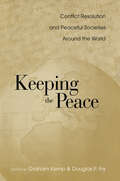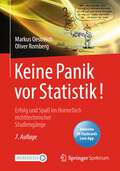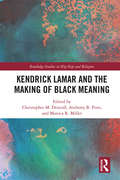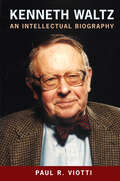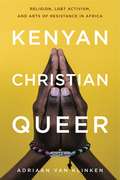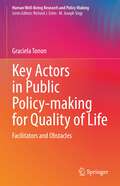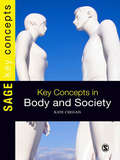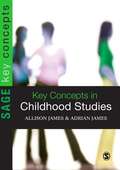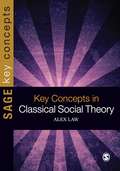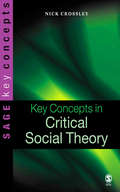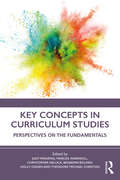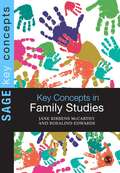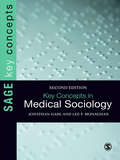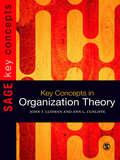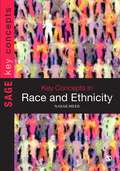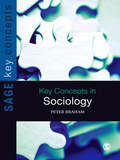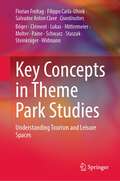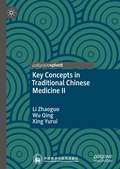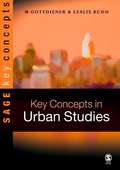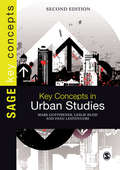- Table View
- List View
Keeping the Peace: Conflict Resolution and Peaceful Societies Around the World
by Douglas P. Fry Graham KempThis collection of ethnographies discusses how non-violent values and conflict resolution strategies can help to create and maintain peace.
Keine Panik vor Statistik!: Erfolg und Spaß im Horrorfach nichttechnischer Studiengänge
by Markus Oestreich Oliver RombergStatistik kann verständlich und witzig sein – gewürzt mit Humor und Cartoons!Dieses Lehrbuch versteht sich als humorvoller Begleiter durch das berühmt-berüchtigte „Durchfallfach“ verschiedenster Studiengänge. Es ebnet mit anschaulichen Beispielen und unterhaltsamen Erklärungen aus dem „typisch“ studentischen Alltag einen Weg ins statistische Denken – und baut eine Brücke zu ernsteren und eher theoretischen Lehrbüchern. Die Autoren stellen den Spaß beim Lernen in den Mittelpunkt, lassen dabei kein Klischee aus, nehmen sich aber auch selbst nicht allzu ernst; ihr erfrischender Stil baut übermäßigen Respekt oder gar Angst vor den Inhalten ab bzw. lässt beides gar nicht erst aufkommen. Inhalt des Buches sind die zentralen Grundlagen der Statistik, wie sie in verschiedensten Studiengängen behandelt werden: neben Grundbegriffen geht es um Kombinatorik, beschreibende Statistik, Wahrscheinlichkeitsrechnung und -verteilungen sowie beurteilende Statistik.Neben vielen Cartoons und Zeichnungen finden sich im Buch natürlich auch Übungsaufgaben mit Lösungen. Leser des gedruckten Buchs erhalten darüber hinaus kostenlosen Zugriff auf mehr als 60 Flashcards zum Buch, mit denen sie ihr Wissen in der Springer-Nature-Flashcards-App testen und ihren eigenen Leistungsstand ermitteln können.
Kendrick Lamar and the Making of Black Meaning (Routledge Studies in Hip Hop and Religion)
by Anthony B. Pinn Monica R. Miller Christopher M. DriscollKendrick Lamar has established himself at the forefront of contemporary hip-hop culture. Artistically adventurous and socially conscious, he has been unapologetic in using his art form, rap music, to address issues affecting black lives while also exploring subjects fundamental to the human experience, such as religious belief. This book is the first to provide an interdisciplinary academic analysis of the impact of Lamar’s corpus. In doing so, it highlights how Lamar’s music reflects current tensions that are keenly felt when dealing with the subjects of race, religion and politics. Starting with Section 80 and ending with DAMN., this book deals with each of Lamar’s four major projects in turn. A panel of academics, journalists and hip-hop practitioners show how religion, in particular black spiritualties, take a front-and-center role in his work. They also observe that his astute and biting thoughts on race and culture may come from an African American perspective, but many find something familiar in Lamar’s lyrical testimony across great chasms of social and geographical difference. This sophisticated exploration of one of popular culture’s emerging icons reveals a complex and multi faceted engagement with religion, faith, race, art and culture. As such, it will be vital reading for anyone working in religious, African American and hip-hop studies, as well as scholars of music, media and popular culture.
Kenneth Waltz: An Intellectual Biography
by Paul R. ViottiKenneth Waltz (1924–2013) is perhaps the most enduringly influential figure in international relations theory of the second half of the twentieth century. He is considered the father of the structural-realist or neorealist school, and his views on core questions, such as the causes of war and the structure of the international system, are foundational to the field today and likely will remain so for decades to come. Waltz’s writings on both theoretical and policy-related topics, from the balance of power to the spread of nuclear weapons, continue to fuel debate.This book is a groundbreaking intellectual biography of Kenneth Waltz, shedding new light on the development and significance of his key contributions. Paul R. Viotti draws on extensive, candid interviews with Waltz as well as Waltz’s personal files and archival research to provide a nuanced account of the great scholar’s life and thought. He traces the intellectual sources and personal experiences that shaped Waltz’s work, including an intense Lutheran upbringing; service in World War II and the Korean War; and the academic environments of Oberlin College, Columbia University, and the University of California, Berkeley. Viotti examines the key influences on Waltz’s major works, Man, the State, and War and Theory of International Politics, and analyzes their distinctive insights. Engaging with the views of Waltz’s critics and featuring reminiscences from his colleagues, this book is a compelling portrait of an intellectual titan.
Kenyan, Christian, Queer: Religion, LGBT Activism, and Arts of Resistance in Africa (Africana Religions #3)
by Adriaan van KlinkenPopular narratives cite religion as the driving force behind homophobia in Africa, portraying Christianity and LGBT expression as incompatible. Without denying Christianity’s contribution to the stigma, discrimination, and exclusion of same-sex-attracted and gender-variant people on the continent, Adriaan van Klinken presents an alternative narrative, foregrounding the ways in which religion also appears as a critical site of LGBT activism.Taking up the notion of "arts of resistance," Kenyan, Christian, Queer presents four case studies of grassroots LGBT activism through artistic and creative expressions—including the literary and cultural work of Binyavanga Wainaina, the "Same Love" music video produced by gay gospel musician George Barasa, the Stories of Our Lives anthology project, and the LGBT-affirming Cosmopolitan Affirming Church. Through these case studies, Van Klinken demonstrates how Kenyan traditions, black African identities, and Christian beliefs and practices are being navigated, appropriated, and transformed in order to allow for queer Kenyan Christian imaginations.Transdisciplinary in scope and poignantly intimate in tone, Kenyan, Christian, Queer opens up critical avenues for rethinking the nature and future of the relationship between Christianity and queer activism in Kenya and elsewhere in Africa.
Kenyan, Christian, Queer: Religion, LGBT Activism, and Arts of Resistance in Africa (Africana Religions #3)
by Adriaan van KlinkenPopular narratives cite religion as the driving force behind homophobia in Africa, portraying Christianity and LGBT expression as incompatible. Without denying Christianity’s contribution to the stigma, discrimination, and exclusion of same-sex-attracted and gender-variant people on the continent, Adriaan van Klinken presents an alternative narrative, foregrounding the ways in which religion also appears as a critical site of LGBT activism.Taking up the notion of “arts of resistance,” Kenyan, Christian, Queer presents four case studies of grassroots LGBT activism through artistic and creative expressions—including the literary and cultural work of Binyavanga Wainaina, the “Same Love” music video produced by gay gospel musician George Barasa, the Stories of Our Lives anthology project, and the LGBT-affirming Cosmopolitan Affirming Church. Through these case studies, Van Klinken demonstrates how Kenyan traditions, black African identities, and Christian beliefs and practices are being navigated, appropriated, and transformed in order to allow for queer Kenyan Christian imaginations.Transdisciplinary in scope and poignantly intimate in tone, Kenyan, Christian, Queer opens up critical avenues for rethinking the nature and future of the relationship between Christianity and queer activism in Kenya and elsewhere in Africa.
Kerala: The Paradoxes of Public Action and Development
by Joseph TharamangalamRevised and edited papers presented during a two-day workshop in Trivandrum in 1999.
Key Actors in Public Policy-making for Quality of Life: Facilitators and Obstacles (Human Well-Being Research and Policy Making)
by Graciela TononThis book analyzes how quality of life research results can be transferred to policy making, and considers the role of actors in this process---researchers, policy makers, and citizens---as well as their interrelationships. This book points to the need to include actors other than the state in public policy-making related to quality of life and well-being issues, in defining problems and formulating alternatives. It identifies obstacles and facilitators in the process and offers a review of different types of aid that affect well-being and quality of life. Finally, it shows possible pathways for various stakeholders in policy-making to interact with one another in the building of good societies.
Key Concepts in Body and Society (SAGE Key Concepts series)
by Dr Kate Cregan"This is a very useful book outlining the key concepts of the body in society. It is easy to read and provides useful examples, making it ideal for students across a range of social science disciplines." - Dr Sharron Hinchliff, Sheffield University "Cregan has achieved something distinct: an account of the sociology of the body which incorporates both theory and empirical studies, which demonstrates excellent coverage of an ever expanding field, and which is written in an accessible style... An intelligent treatment and account of the sociology of the body, which I look forward to incorporating into my teaching." - Dr Rob Meadows, University of Surrey "This book is a great idea. It provides a thorough, accessible and interesting introduction to the most important concepts in the sociology of the body. Students new to this area will find it invaluable." - Professor Deborah Lupton, University of Sydney This book provides a clear, focused road map to the study of the body in society. It defines, explains and applies core topics relating to the human body demonstrating how we approach it as a social phenomenon. Each concept: Includes an easy to understand definition Provides real-world examples Gives suggestions for further reading Is carefully cross-referenced to other related concepts. Written to meet the needs of the modern student, this book offers the basic materials, tools and guidance needed study and write about the body.
Key Concepts in Childhood Studies
by Allison James Adrian James'This is a superb introduction to the fascinating field of childhood studies. A series of well chosen entries provide concise summaries of key ideas, and accessible introductions to some highly complex issues. The authors brilliantly weave together their different themes with their use of cross-referencing, so that the whole is even richer than the individual parts. I would recommend it to any beginning student of Childhoods Studies, as well as more advanced ones' - Nigel Thomas, Professor of Childhood & Youth Research, University of Central Lancashire A systematic, clear introduction to the expanding field of Childhood Studies. Valuable entries including Agency, Play and Welfare introduce key ideas and explore interwoven multi-disciplinary themes. Definitions, summaries and key words are developed and cross-referenced by the book's intelligent organisation and flow to explain in-depth issues as respected pioneers Alison James and Adrian James offer students and specialists: - Lucid accounts of the key concepts - Authoritative and reliable data - Accessible text format The book is an ideal primer and refresher for students of Childhood Studies. Alison James is Professor in Sociology and Adrian James is Professor in Social Work, both at The University of Sheffield. Entries on: Age Agency Best interests Child Child-focused Research Child-friendly Childhood Childhood Studies Children's Voices Citizenship Competence Cultural Politics Childhood Cultural Relativism Delinquency Developmental Psychology Disappearance or Loss of Childhood Diversity Ethnicity Family Friendship Futurity Gender Generation Health Innocence Interpretive Reproduction Minority Group Status Nature vs. Nurture Needs Parenting Participation Peer Group Play Poverty Protection Representation Rights Schooling and Schools Sexual Abuse Social Actor Social Construction Social World Socialisation Spaces for Children and Children's Spaces Standpoint Street-children Structure Vulnerability Welfare Working Children Youth
Key Concepts in Classical Social Theory (SAGE Key Concepts series)
by Alex Law"I think this will prove to be a very useful text for undergraduate students. Alex Law has produced a comprehensive list of key classical social theory concepts and provides an accessible account of the meaning of central terms, their place in the work of the classical analysts considered and the contemporary significance of their ideas. In addition he has offered useful additional reading guidance from which students will derive considerable benefit." - Barry Smart, University of Portsmouth This book′s individual entries introduce, explain and contextualise the key topics within classical social theory. Definitions, summaries and key words are developed throughout with careful cross-referencing allowing students to move effortlessly between core ideas and themes. Each entry provides: clear definitions lucid accounts of key issues up-to-date suggestions for further reading informative cross-referencing. Relevant, focused and accessible this book will provide students across the social sciences with an indispensible guide to the central concepts of classical social theory.
Key Concepts in Community Studies (SAGE Key Concepts series)
by Tony BlackshawThis book defines the current identity of community studies, provides a critical but reliable introduction to its key concepts and is an engaging guide to the key social research methods used by community researchers and practitioners. Concise but clear, it caters for the needs of those interested in community studies by offering cross-referenced, accessible overviews of the key theoretical issues that have the most influence on community studies today It incorporates all of the important frames of reference including those which are: * theoretical * research focused * practice and policy oriented * political * concerned about the place of community in everyday life. The extensive bibliographies and up-to-date guides to further reading reinforce the aim of the book to provide an invaluable learning resource. Interdisciplinary in approach and inventive in its range of applications this book will be of value to students studying sociology, social policy, politics and community development.
Key Concepts in Critical Social Theory (SAGE Key Concepts series)
by Nick Crossley'Clear and accessible - Key Concepts in Critical Social Theory makes difficult ideas available to an undergraduate audience' -Larry Ray, Professor of Sociology, University of Kent The SAGE Key Concepts series provides students with accessible and authoritative knowledge of the essential topics in a variety of disciplines. Cross-referenced throughout, the format encourages critical evaluation through understanding. Written by experienced and respected academics, the books are indispensable study aids and guides to comprehension. Key Concepts in Critical Social Theory: * Provides brief accounts of the central ideas behind the key concepts of critical social theory * Prepares students to tackle primary texts and/or gives them a point of reference when they find themselves stuck * Discusses each concept in an introductory way * Offers further reading guidance for independent learning * Is essential reading for undergraduates in sociology and across the social sciences. Providing brief accounts of the central ideas behind the key concepts of critical social theory, this book prepares students to tackle primary texts and/or gives them a point of reference when they find themselves stuck. Each concept is discussed in an introductory manner. The book offers further reading guidance for independent learning.
Key Concepts in Curriculum Studies: Perspectives on the Fundamentals
by Judy Wearing Theodore Michael Christou Marcea Ingersoll Christopher DeLuca Benjamin Bolden Holly OgdenOffering an accessible entry into curriculum theory, this book defines and contextualizes key concepts for novice and experienced students. Leading scholars in curriculum studies provide short anchor texts that introduce, define, and situate contemporary curriculum theory constructs. Each anchor text is followed by two concise, creative keyword responses that demonstrate varied perspectives and connections, allowing readers to reflect on and engage with the personal relevance of these fundamental concepts. Useful to instructors and scholars alike, this book explains keyword writing as a teaching and learning strategy and invites readers to enter the complicated conversations of contemporary curriculum theory through their own creative, personal responses. Featuring wide-ranging, nuanced, and varied commentary on major relevant themes, as well as discussion questions for students, this book is an essential text for doctoral and masters-level courses in curriculum studies.
Key Concepts in Family Studies (SAGE Key Concepts series)
by Rosalind Edwards Jane Ribbens McCarthy"This is a thoughtful and sometimes challenging elaboration of some of the key concepts in contemporary family studies... Students and researchers will want to have this book close to hand, not simply as a reference work but as a stimulus to critical social analysis." - David H J Morgan, University of Manchester "Written in an intelligent, engaging, and accessible manner by two leading and highly respected family scholars whose contributions to the field over the past two decades have been path-breaking. This is an important resource for students and professionals studying, and working in, the field of family studies within and across the disciplines of sociology, social policy, social work, health studies, education, and gender studies." - Andrea Doucet, Carleton University This book′s individual entries introduce, explain and contextualise key topics within the study of family lives. Definitions, summaries and key words are developed throughout with careful cross-referencing allowing students to move effortlessly between core ideas and themes. Each entry provides: Clear definitions Lucid accounts of key issues Up-to-date suggestions for further reading Informative cross-referencin. Relevant, focused and accessible, this book will provide students with an indispensible guide to the central concepts of family studies.
Key Concepts in Medical Sociology (SAGE Key Concepts series)
by Dr Jonathan Gabe Dr Lee Monaghan"Fills an important gap in medical sociology. In an era of information overload, busy scholars and students will appreciate these accessible introductions to the field's key concepts." - Alan Petersen, Monash University "A handbook for any student to have by their side as they embark on any course exploring the sociology of health, medicine and disease." - Jessica Clark, University Campus Suffolk "A really useful collection of concise, accessible and informative mini essays on a range of medical concepts and conceptualisations. The book is ideal for students, including those following health professional courses, and for more seasoned academics and scholars. A very handy volume." - Jacquelyn Allen-Collinson, Lincoln University How do we understand health in relation to society? What role does culture play in shaping our experiences of, and orientation to, health and illness? How do we understand medicine and medical treatment within a sociological framework? Medical sociology is a dynamic and complex field of study, comprising many concepts which students sometimes find difficult to grasp. This title manages to successfully elucidate this conceptual terrain. The text systematically explains the key concepts that have preoccupied medical sociologists from its inception and which have shaped the field as it exists today. Thoroughly revised and updated, this second edition: Provides a systematic and accessible introduction to medical sociology Includes new relevant entries as well as classic concepts Begins each entry with a definition of the concept, then examines its origins, development, strengths and weaknesses Offers further reading guidance for independent learning Draws on international literature and examples. This title has proved hugely popular among students in medical sociology as well as those undertaking professional training in health-related disciplines. It is essential reading for anyone wanting to find an easily accessible, yet critical and thoughtful, information source about the building blocks of medical sociology and the sociology of health and illness.
Key Concepts in Organization Theory (SAGE Key Concepts series)
by John Teta Luhman Ann L CunliffeFrom agency theory to power and politics, this indispensable guide to the key concepts of organization theory is your compass as you navigate through the often complex and abstract theories about the design and functioning of organizations. Designed to complement and elucidate your textbook or reading list, as well as introduce you to concepts that some courses neglect, this historical and interdisciplinary account of the field:<P><P> - Helps you understand the basics of organization theory<P> - Allows you to check your understanding of specific concepts<P> - Fills in any gaps left by your course reading, and<P> - Is a powerful revision tool<P> Each entry is consistently structured, providing a definition of the concept and why it's important to theory and practice, followed by a summary of current debates and a list of further reading. This companion will provide you with the nuts and bolts of an understanding that will serve you not just in your organization studies course, but throughout your degree and beyond.<P> Key concepts include: agency theory; business strategy; corporate governance; decision making; environmental uncertainty; globalization; industrial democracy; organizational change; stakeholder theory; storytelling and narrative research; technology and organization structure.
Key Concepts in Race and Ethnicity (SAGE Key Concepts series)
by Nasar Meer"A conceptually power-packed volume that is at once erudite and accessible, expansive and focused, true to sociological traditions yet stimulatingly exploratory. Scholars and students will be served very well by this absorbing, far-reaching enquiry into ethnicity and race." - Raymond Taras, Tulane University "This concise, profound, and beautifully written book offers a tour de force across the landscape of race and ethnicity by a young author who masters them all." - Per Mouritsen, Aarhus University This book offers an accessible discussion of both foundational and novel concepts in the study of race and ethnicity. Each account will help readers become familiar with how long standing and contemporary arguments within race and ethnicity studies contribute to our understanding of social and political life more broadly. Providing an excellent starting point with which to understand the contemporary relevance of these concepts, Nasar Meer offers an up-to-date and engaging consideration of everyday examples from around the world. This is an indispensable guide for both students and established researchers interested in the study of race and ethnicity.
Key Concepts in Race and Ethnicity (SAGE Key Concepts series)
by Nasar Meer"An excellent book both for those who are new to the study of race and ethnicity and for established scholars. It will no doubt be the text of choice on many courses and by many students." - Tariq Modood, University of Bristol "A fresh and critical take on key concepts and ideas in the field of race and ethnicity. Nasar Meer's account is a must for all students who are interested in deepening their understanding and it will become an important point of reference." - John Solomos, University of Warwick "A conceptually power-packed volume that is at once erudite and accessible, expansive and focused, true to sociological traditions yet stimulatingly exploratory. Scholars and students will be served very well by this absorbing, far-reaching enquiry into ethnicity and race." - Raymond Taras, Tulane University "This concise, profound, and beautifully written book offers a tour de force across the landscape of race and ethnicity by a young author who masters them all." - Per Mouritsen, Aarhus University This book offers an accessible discussion of both foundational and novel concepts in the study of race and ethnicity. Each account will help readers become familiar with how long standing and contemporary arguments within race and ethnicity studies contribute to our understanding of social and political life more broadly. Providing an excellent starting point with which to understand the contemporary relevance of these concepts, Nasar Meer offers an up-to-date and engaging consideration of everyday examples from around the world. This is an indispensable guide for both students and established researchers interested in the study of race and ethnicity.
Key Concepts in Sociology (SAGE Key Concepts series)
by Mr Peter H Braham"A glossary of key concepts was just the sort of thing I needed when I was a sociology student. Peter Braham has written a lively, comprehensive guide to the most important concepts in our discipline. It will become an essential student resource." - David Silverman, Goldsmith's and King's College, University of London "A triumphant tour de force... will be a useful, even essential tool for students and faculty. It is actually fascinating reading even for non-sociologists since these ideas (identity, the body, postmodernity...) impact all of us all the time." - Anthony Synnott, Concordia University in Montreal "An invaluable intellectual tool for students and faculty across the social sciences... fires the mind for continued learning." - Joseph Oliver Boyd-Barrett, Bowling Green State University, Ohio "A crisp and comprehensive guide to the discipline. The thirty-eight entries, covering history, substance and evaluation, thereby describe both conventional and new topics that define the syllabus of modern sociology. A valuable guide to both teachers and students." - Bryan S. Turner, Presidential Professor of Sociology, CUNY USA Sociology consists of a myriad of frequently confusing concepts. Key Concepts in Sociology provides a comprehensive, lively and clearly-written guide to the most important concepts in the subject. It includes both what might be regarded as 'classic' sociological concepts, such as 'class', 'bureaucracy' and 'community', as well as subjects that have become increasingly prominent in recent times, such as 'celebrity', 'risk' and 'the body'. Each of the thirty-eight substantive entries: defines the concept provides a clear and compelling narrative clarifies the main debates, perspectives and disagreements gives advice on further reading Key Concepts in Sociology should be the first choice for sociology students at all levels of learning.
Key Concepts in Theme Park Studies: Understanding Tourism and Leisure Spaces
by Filippo Carlà-Uhink Florian Freitag Salvador Anton ClavéThis book offers a comprehensive, multidisciplinary introduction to theme parks and the field of theme park studies. It identifies and discusses relevant economic, social, and cultural as well as medial, historical, and geographical aspects of theme parks worldwide, from the big international theme park chains to smaller, regional, family-operated parks. The book also describes the theories and methods that have been used to study theme parks in various academic disciplines and reviews the major contexts in which theme parks have been studied. By providing the necessary backgrounds, theories, and methods to analyze and understand theme parks both as a business field and as a socio-cultural phenomenon, this book will be a great resource to students, academics from all disciplines interested in theme parks, and professionals and policy-makers in the leisure and entertainment as well as the urban planning sector.
Key Concepts in Traditional Chinese Medicine II
by Li Zhaoguo Wu Qing Xing YuruiThis book offers an overview of Chinese medicine terminology translation, defining the central concepts in Chinese traditional medicine, providing simplified Chinese characters, Mandarin Pronunciation in pinyin, citations for 110 of the most key concepts in traditional Chinese medicine and culture. Covering definitions of terms relating to visceral manifestation, meridians, etiology, pathogenesis, and treatment principles in traditional medicine, it offers a selection of English versions of each term in addition to a standard of English version, drawing on the translation history of traditional Chinese medicine. It provides a useful resource to understand the fundamental terms of traditional Chinese medicine and culture in Chinese and English, and their relevance to cross-cultural discourse.
Key Concepts in Urban Studies
by Mark Gottdiener Mr Leslie BuddThe SAGE Key Concepts series provides students with accessible and authoritative knowledge of the essential topics in a variety of disciplines. Cross-referenced throughout, the format encourages critical evaluation through understanding. Written by experienced and respected academics, the books are indispensable study aids and guides to comprehension. Key Concepts in Urban Studies: * Clearly and concisely explains the basic ideas in the interdisciplinary field of urban studies * Offers concise discussions of concepts ranging from community, neighbourhood, and the city to globalization, the New Urbanism, feminine space, and urban problems * Constitutes a re-examination of the key ideas in the field * Is illustrated throughout with international examples * Provides an essential reference guide for all students and teachers across the urban disciplines within sociology, political science, planning and geography.
Key Concepts in Urban Studies (SAGE Key Concepts series)
by Mark Gottdiener Mr Leslie Budd Professor Panu Lehtovuori"Key Concepts in Urban Studies is written in an accessible, concise way and introduces students to the key topics in urban studies. Drawing examples from different parts of the world, this authoritative resource exposes students to the diverse forms that cities take, and the social, spatial and temporal dimensions of urban living. It is an essential resource for students across disciplines interested in the city." - Lily Kong, Singapore Management University "An insightful multidisciplinary introduction to the multifarious places, processes and problems that constitute modern cities. Its short, digestible entries unpack the complexity and evolution of urban conditions, offering cross-references between concepts and links to key literature and to useful current and historical examples. The book’s clear, often sharp critical edge also encourages deeper enquiry." - Quentin Stevens, School of Architecture and Design, RMIT University Key Concepts in Urban Studies is an essential companion for students of urban studies, urban sociology, urban politics, urban planning and urban development. This revised edition has been updated and expanded to provide a keen global focus, particularly in emerging economies with discussions on the creation of “dream cities” in the Gulf States and a renewed emphasis on building mega-scaled “downtowns” in India and China. New features include: Contemporary and international examples throughout. Detailed entries on environmental concerns and the sustainability of urban development. Discussion of the role of consumption in city culture and urban development. New entries on modern urban planning and adaptive urbanism. Key Concepts in Urban Studies is a must-have text with an explicit focus on contemporary urbanism which students will find invaluable during their studies. Mark Gottdiener is Professor Emeritus of Sociology at The University at Buffalo (SUNY). Leslie Budd is Reader in Social Science at the Open University. Panu Lehtovuori is Professor of Planning Theory at Tampere University of Technology.
Key Concepts in Urban Studies (SAGE Key Concepts series)
by Mark Gottdiener Mr Leslie Budd Professor Panu Lehtovuori"Key Concepts in Urban Studies is written in an accessible, concise way and introduces students to the key topics in urban studies. Drawing examples from different parts of the world, this authoritative resource exposes students to the diverse forms that cities take, and the social, spatial and temporal dimensions of urban living. It is an essential resource for students across disciplines interested in the city." - Lily Kong, Singapore Management University "An insightful multidisciplinary introduction to the multifarious places, processes and problems that constitute modern cities. Its short, digestible entries unpack the complexity and evolution of urban conditions, offering cross-references between concepts and links to key literature and to useful current and historical examples. The book's clear, often sharp critical edge also encourages deeper enquiry." - Quentin Stevens, School of Architecture and Design, RMIT University Key Concepts in Urban Studies is an essential companion for students of urban studies, urban sociology, urban politics, urban planning and urban development. This revised edition has been updated and expanded to provide a keen global focus, particularly in emerging economies with discussions on the creation of "dream cities" in the Gulf States and a renewed emphasis on building mega-scaled "downtowns" in India and China. New features include: Contemporary and international examples throughout. Detailed entries on environmental concerns and the sustainability of urban development. Discussion of the role of consumption in city culture and urban development. New entries on modern urban planning and adaptive urbanism. Key Concepts in Urban Studies is a must-have text with an explicit focus on contemporary urbanism which students will find invaluable during their studies. Mark Gottdiener is Professor Emeritus of Sociology at The University at Buffalo (SUNY). Leslie Budd is Reader in Social Science at the Open University. Panu Lehtovuori is Professor of Planning Theory at Tampere University of Technology.
